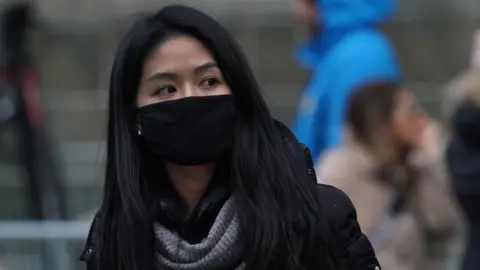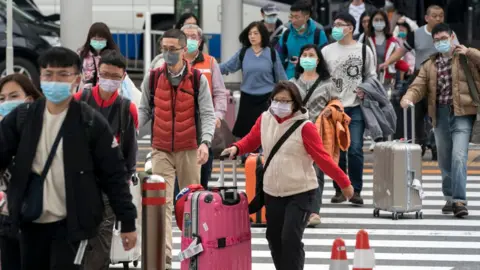Chinese diasporas stockpile surgical masks, fret over infection
 Getty Images
Getty ImagesHours after the first case of coronavirus was confirmed in the US, surgical masks began selling out at the pharmacies in Seattle, where a resident recently returned from China had fallen ill.
Now, reports have emerged of runs on pharmacies in New York and stockpiles being collected in Los Angeles.
In Washington DC, masks have been sold out since the weekend, as the number of confirmed cases in the US rose to five.
"I immediately ordered a box of masks online after I heard of the first US case," said Tina Liu, a Chinese student at the University of Washington, not far from Seattle in Washington state.
Since 8 December 2019, when the first cases of the mysterious coronavirus lung illness were reported in Wuhan, China, more than 500 residents there have been infected.
Billions of people are on edge - but not just in China.
As cases are reported in the US and a handful in other countries outside of China, the anxiety coronavirus has sparked among Chinese overseas is palpable.
The outbreak of the most serious epidemic in Asia since 2003 has brought unwelcome memories of the Sars emergency, as well as new anxieties in the age of social media and increased global travel.
Since the Sars outbreak of 2003, China has undergone a massive transformation.
Nearly 150 million Chinese travelled abroad in 2018, compared to 20.2 million in 2003.
Some 360,000 Chinese students study in the US and travel between the two countries frequently.
Hundreds of millions of Chinese have gained access to social media, which did not exist during the Sars outbreak.
From thousands of miles away, members of the Chinese diaspora are worrying for their families from afar, or fretting over getting sick themselves.
 Getty Images
Getty Images"It's hard not to worry, as you're based overseas and can't do much about it," said Rui Zhong, a Chinese-American living in Maryland with family in Wuhan, where millions of residents are under quarantine.
Thousands of miles apart, Ms Zhong and her family are constantly exchanging information about the outbreak on WeChat, a Chinese messaging platform.
In Seattle, many Chinese residents are on high alert, Ms Liu told BBC. Some 65,000 Chinese travellers visit the US each year, and the two confirmed cases in the US are individuals who fell ill after recently returning from China.
Although she had not seen many people wearing masks in Seattle, Ms Liu decided to wear one as a precautionary measure. "It's better to be safe than sorry," she said.
Amid the health emergency, the Chinese government has loosened its censorship controls and sought to apply lessons learnt from the Sars epidemic to prevent a repeat of the 2003 disaster.
Whereas information about the outbreak was tightly controlled in previous weeks, coverage of the outbreak has been liberalised in China, and news from Wuhan now circulates more freely on Chinese social media platforms.
Compared to the Sars epidemic, the Chinese government has been "more open" to sharing information, according to Amesh Adalja, an expert at the Johns Hopkins University Center for Health Security.
In the 2003 epidemic, China was criticised by the international community for concealing the scale of the outbreak, which led to the virus spreading to 26 countries and killing nearly 800 people.
With coronavirus, "China has provided more timely updates about case counts and made the virus sequence public early", Dr Adalja said.
That has helped the world take more proactive measures to tackle the outbreak, he said.
Modern technology and the larger global Chinese community means the diaspora is reacting differently, too.
Overseas Chinese have used social media to launch crowdfunding campaigns to send medical supplies to Wuhan, for examples.
Muyi Xiao, a Wuhan native who currently lives in New York City, was the first to warn her family about the virus after reading reports in the international media.
She alerted her family in Wuhan to take precautionary measures in late December 2019. "They didn't think it was a big deal back then," she told BBC.

Learn more about the new virus
 Getty
Getty- Your questions: You asked, we answered
- The story explained: How worried should we be?
- Wuhan profiled: The city now in lockdown
- In detail: Follow all our coverage here

